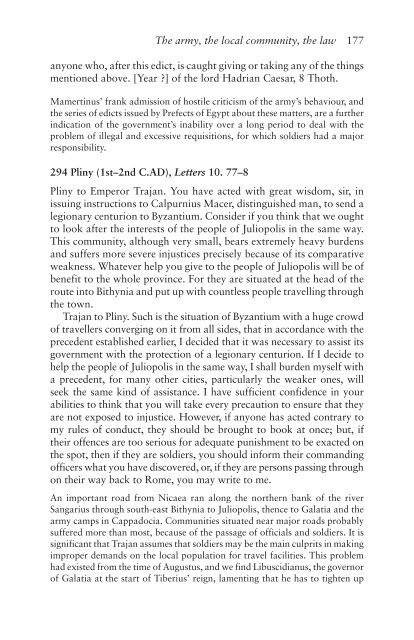The Roman Army, 31 BC–AD 337: A Sourcebook
The Roman Army, 31 BC–AD 337: A Sourcebook
The Roman Army, 31 BC–AD 337: A Sourcebook
You also want an ePaper? Increase the reach of your titles
YUMPU automatically turns print PDFs into web optimized ePapers that Google loves.
<strong>The</strong> army, the local community, the law 177<br />
anyone who, after this edict, is caught giving or taking any of the things<br />
mentioned above. [Year ?] of the lord Hadrian Caesar, 8 Thoth.<br />
Mamertinus’ frank admission of hostile criticism of the army’s behaviour, and<br />
the series of edicts issued by Prefects of Egypt about these matters, are a further<br />
indication of the government’s inability over a long period to deal with the<br />
problem of illegal and excessive requisitions, for which soldiers had a major<br />
responsibility.<br />
294 Pliny (1st–2nd C.AD), Letters 10. 77–8<br />
Pliny to Emperor Trajan. You have acted with great wisdom, sir, in<br />
issuing instructions to Calpurnius Macer, distinguished man, to send a<br />
legionary centurion to Byzantium. Consider if you think that we ought<br />
to look after the interests of the people of Juliopolis in the same way.<br />
This community, although very small, bears extremely heavy burdens<br />
and suffers more severe injustices precisely because of its comparative<br />
weakness. Whatever help you give to the people of Juliopolis will be of<br />
benefit to the whole province. For they are situated at the head of the<br />
route into Bithynia and put up with countless people travelling through<br />
the town.<br />
Trajan to Pliny. Such is the situation of Byzantium with a huge crowd<br />
of travellers converging on it from all sides, that in accordance with the<br />
precedent established earlier, I decided that it was necessary to assist its<br />
government with the protection of a legionary centurion. If I decide to<br />
help the people of Juliopolis in the same way, I shall burden myself with<br />
a precedent, for many other cities, particularly the weaker ones, will<br />
seek the same kind of assistance. I have sufficient confidence in your<br />
abilities to think that you will take every precaution to ensure that they<br />
are not exposed to injustice. However, if anyone has acted contrary to<br />
my rules of conduct, they should be brought to book at once; but, if<br />
their offences are too serious for adequate punishment to be exacted on<br />
the spot, then if they are soldiers, you should inform their commanding<br />
officers what you have discovered, or, if they are persons passing through<br />
on their way back to Rome, you may write to me.<br />
An important road from Nicaea ran along the northern bank of the river<br />
Sangarius through south-east Bithynia to Juliopolis, thence to Galatia and the<br />
army camps in Cappadocia. Communities situated near major roads probably<br />
suffered more than most, because of the passage of officials and soldiers. It is<br />
significant that Trajan assumes that soldiers may be the main culprits in making<br />
improper demands on the local population for travel facilities. This problem<br />
had existed from the time of Augustus, and we find Libuscidianus, the governor<br />
of Galatia at the start of Tiberius’ reign, lamenting that he has to tighten up



